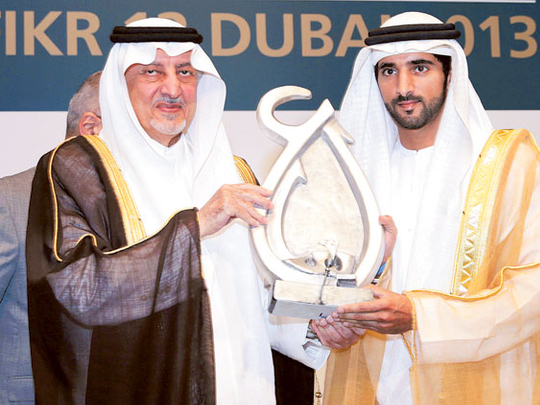
Dubai: Most private sector companies prioritise soft skills over critical skills when hiring, a survey of 20 Arab countries conducted for the Arab Thought Foundation has revealed.
The survey was presented at the opening ceremony of the 12th annual meeting of the Arab Thought Foundation — Fikr- which opened in Dubai on Wednesday.
His Highness Shaikh Mohammad Bin Rashid Al Maktoum, Vice-President and Prime Minister of the UAE and Ruler of Dubai, inaugurated the conference titled ‘Job Creation: 80 Million Jobs by 2020 in the Arab World’. The conference takes its title from a report by the World Bank that showed that over the next two decades, the Middle East and North Africa (Mena) region needs to create around 80 million jobs to accommodate the growing labour force.
The event was also attended by Shaikh Hamdan Bin Mohammad Bin Rashid Al Maktoum, Crown Prince of Dubai; Shaikh Maktoum Bin Mohammad Bin Rashid Al Maktoum, Deputy Ruler of Dubai; Shaikh Majid Bin Mohammad Bin Rashid Al Maktoum, Chairman of the Dubai Culture and Prince Khalid Al Faisal, President of the Arab Thought Foundation..
The survey which was conducted by the Arab Thought Foundation in collaboration with PricewaterhouseCoopers (PWC), and international financial services company
Emad Tinawi, partner at PricewaterhouseCoopers (PWC), told Gulf News that the survey asked stakeholders across the Arab world about how they perceive some of the challenges for addressing job creation and employment in the Arab world, especially focusing on the youth.
“The survey was meant to fill the gap in the literature, as there are a lot of studies about job creation and unemployment in the Arab world, but no one looked at regional integration - no one asked what the role of integration is.” Tinawi said.
Regional integration, he explained, is simple forms of collaborations and integrations between two or more countries. But he said that they did not define the term to the participants of the survey, because they wanted people to interpret it the way they see it.
The central finding of the survey,Tinawi noted, was that 88 per cent believed that regional integration plays an important role in Arab Job creation and there is a need to address it; however, he said that there was a disagreement on how and when this can be done.
“When we spoke to some of the respondents regarding regional integration, some said it would not happen, some said it’s a long term dream, and some people said that it is already happening in the GCC and it is getting into rapid integration.”
He said that the purpose of both the conference and the survey is to generate debate and try to generate a plan to help with this regional economic integration. “It could be something as simple as harmonising laws around company formations, harmonising accounting standards… sharing experiences between governments on things they are doing in terms of job creation.”
Tinawi added that the survey confirmed previous findings regarding the job market and unemployment, such as that the private sector needs to play a more active role in entrepreneurship, that the private sector needs more incentives.
“One surprising finding was that the private sector priorities soft skills above everything else and critical skills were at the bottom… its understandable why they are looking at soft skills, such as team building, and work ethics, but it was puzzling why critical and analytical skills were at the bottom.”
He added that they followed up with respondents from the private sector through one on one interviews to understand why they values soft skills over critical skills. “The responses varied, but the basic point was that Arab youth have technical skills but they don’t have work ethics,like coming to work on time, team spirit and the skills that allows them to be effective and utilise their skills in the employment context.”










